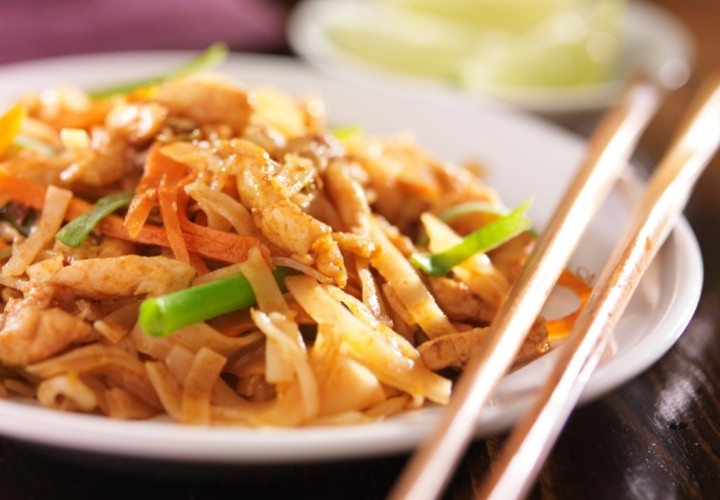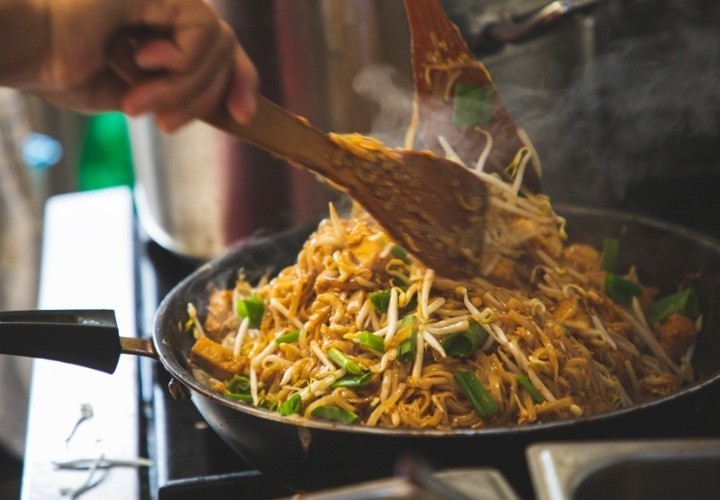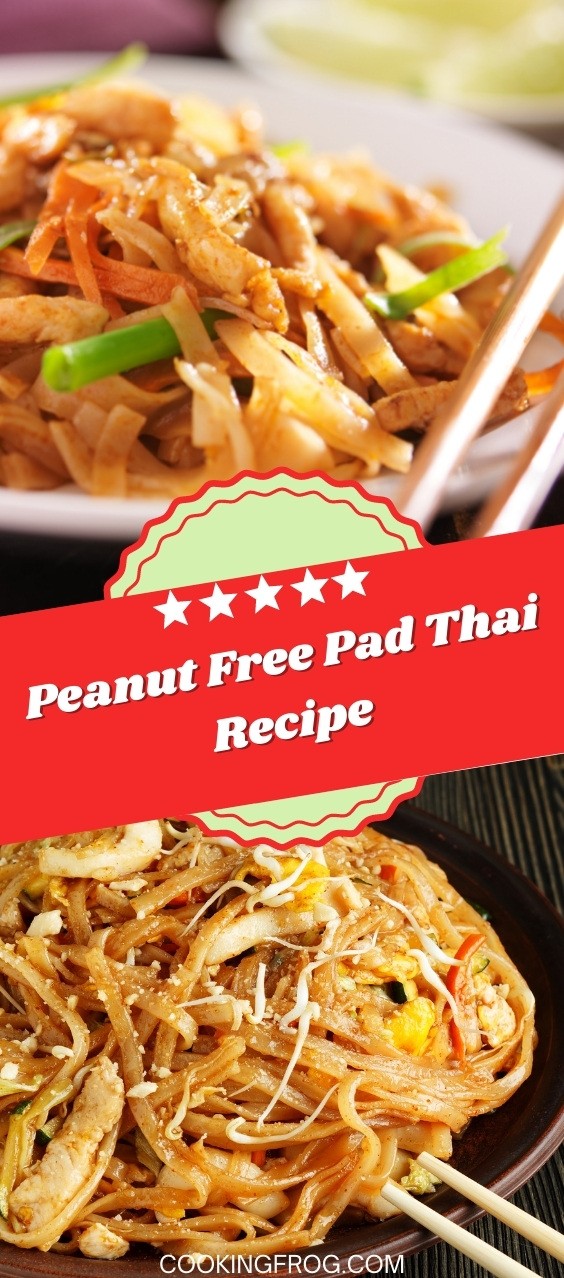This Peanut Free Pad Thai Recipe is as tasty as the version that includes peanuts. Keeping all the flavors of original Pad Thai Recipe, is a treat to all that have allergy to peanuts, as well as for those that don’t.
Peanut Free Pad Thai
When I asked the question to some of my friends “If you’re not limited by any food allergies, what meals would you order from Asian restaurants?” A lot of them responded with a peanut-free Pad Thai. I believe many would agree and it’s my personal favorite dish to order at a Thai restaurant.
However since my of my kids has a history of reacting to peanuts, Thai food generally was a rare treat in our home, so rare that I can barely remember when I made it last time.
I’ve made a lot of Thai recipes before, even on this site I have a recipe that is very popular. However, with my present situation, i must adjust. So I’ve decided to make it taste even better than the version that includes peanuts. Before that, I would like to talk about the analysis of Pad Thai Allergens because I’ve mastered the subject and feel obligated to share my findings with you.
Ingredients
For the Sauce
-
3 Tbsp fish sauce
-
2 Tbsp brown sugar
-
2 Tbsp lime juice
-
1 tsp sriracha sauce (optional, to taste)
-
¼ cup hot water
For the Stir-Fry
-
1 Tbsp olive oil (or vegetable oil)
-
½ medium yellow onion, chopped
-
3 garlic cloves, minced
-
4 scallions, cut into 1–2 inch pieces (white parts separated from green)
-
1 boneless, skinless chicken thigh, diced
-
8 large shrimp, peeled and deveined
-
4 oz firm tofu, pressed, pan-fried, and cubed
-
2 cups mung bean sprouts
-
½ lb fresh rice noodles (or dried, soaked for 1 hour in cold water)
-
2 eggs
-
Extra oil as needed
For Serving
-
Fresh lime wedges
-
Extra bean sprouts and green scallions for garnish
Instructions
Step 1: Prep the Noodles
-
If using dried rice noodles, soak them in cold water for about 1 hour until pliable. Drain well.
-
If using fresh noodles, separate gently by hand.
Step 2: Make the Sauce
-
In a small bowl, whisk together fish sauce, brown sugar, lime juice, sriracha, and hot water. Set aside.
Step 3: Start the Stir-Fry
-
Heat a wok (or large skillet) over medium-high heat until a drop of water sizzles. Add 1 Tbsp oil.
-
Add the onion, garlic, and white parts of the scallions. Stir-fry 30 seconds, until fragrant.
Step 4: Cook the Protein
-
Add the diced chicken and cook 2 minutes until about halfway done.
-
Add shrimp and stir-fry another 2 minutes until just pink.
-
Add the tofu cubes and toss to combine.
Step 5: Add Noodles & Sauce
-
Add noodles, half the bean sprouts, and half the green scallions.
-
Pour in the sauce and stir-fry 3–5 minutes, tossing constantly until the noodles absorb most of the liquid and turn glossy.
Step 6: Scramble the Eggs
-
Push noodles to one side of the pan. Add a drizzle of oil, crack in both eggs, and gently scramble until set.
-
Fold the eggs into the noodles.
Step 7: Serve
-
Plate the Pad Thai and top with remaining bean sprouts and scallions.
-
Serve immediately with lime wedges for squeezing.
Tips & Notes
-
Tofu: Pan-fry until golden before adding; it keeps its shape better.
-
Heat level: Adjust sriracha or add dried chili flakes if you prefer spicier Pad Thai.
-
Make-Ahead: The sauce can be prepared 3 days in advance and stored in the fridge.
-
Freezer: Pad Thai is best fresh, but cooked chicken, shrimp, and tofu can be frozen separately and added when reheating noodles.
Homemade Pad Thai That is Both Allergy Friendly and Authentic
The nature of cooking for anyone with food allergies involves substitutes and modified recipes. But I’ve wanted to be cautious not to change it to the level of making something different and calling it Pad Thai.
Some individuals may want to substitute the crunch and flavor of peanuts with crushed sunflower seeds. Which really is a great alternative for those for folks who aren’t allergic to sunflower seeds. But when you use sunflower seed butter, then it becomes a recipe similar to sesame noodles. Or like dan dan mein, both that use peanut butter in the sauce and taste awesome but certainly not pad thai.
Within my quest to master why is Pad Thai authentic and resembles what is made and served from the street carts in Thailand, I’ve found that the reddish color is more of an American style. And using tomato ketchup to give Pad Thai a red color is critiqued.
Pad Thai gets its slightly red colorization when prepared with whole shrimp. When you take of the shell and the top, leave the juicy guts which turn red when you cook. Maybe shrimp heads and guts may appear unpleasant to the Americans, but whole shrimp is actually really tasty.
If utilizing the “nasty parts” from shrimp is really a deal-breaker, then try using paprika or sriracha. To supply the noodles a reddish color with only a little spicy kick. I bought my first bottle of sriracha sauce produced by|created by Huy Fong Foods, top 8 allergen free, gluten free, and certified Kosher with this recipe.




